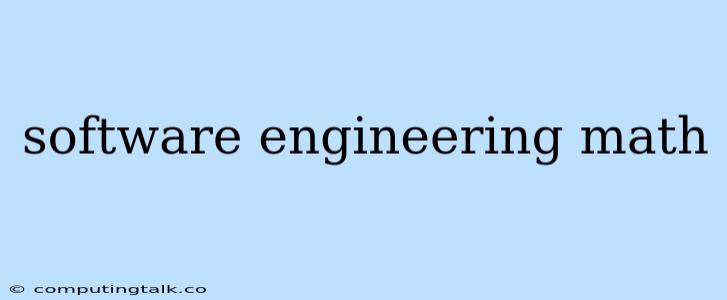Software engineering and mathematics might seem like disparate fields, but beneath the surface lies a deep and intricate connection. While software engineering focuses on building software systems, mathematics provides the foundation for understanding, analyzing, and optimizing these systems. From algorithms to data structures, mathematics plays a crucial role in shaping the very core of software development.
Why Is Math Important in Software Engineering?
At its heart, software engineering is about problem-solving. This involves identifying patterns, understanding relationships, and devising efficient solutions. Mathematics, with its emphasis on logical reasoning, abstraction, and precise definitions, equips software engineers with the necessary tools to tackle these challenges.
1. Algorithm Design and Analysis:
Algorithms, the heart of any software system, are essentially mathematical recipes for solving specific problems. Understanding mathematical concepts like time complexity and space complexity helps engineers analyze the efficiency of algorithms and choose the most optimal solution for a given scenario. This knowledge is essential for building software that performs well under various conditions and scales effectively.
2. Data Structures and Algorithms:
Data structures, like arrays, linked lists, and trees, are fundamental building blocks of software. Understanding their mathematical properties, such as traversal algorithms and search algorithms, enables engineers to design efficient data management systems.
3. Probability and Statistics:
For many software applications, particularly in fields like machine learning and data analysis, probability and statistics are indispensable. Engineers need to understand concepts like probability distributions, statistical inference, and hypothesis testing to make informed decisions about data interpretation and model building.
4. Discrete Mathematics:
Discrete mathematics, which deals with finite and countable objects, is crucial for areas like cryptography, network design, and compiler construction. Understanding concepts like graph theory, logic, and set theory allows software engineers to design secure systems, optimize network connections, and build efficient compilers.
5. Linear Algebra:
Linear algebra, the study of vectors and matrices, is crucial for applications involving machine learning, image processing, and computer graphics. Understanding concepts like eigenvalues, eigenvectors, and matrix factorization empowers engineers to build algorithms that efficiently manipulate and analyze high-dimensional data.
How Can Software Engineers Enhance Their Mathematical Skills?
While a strong foundation in mathematics is essential, it's not always necessary to be a math whiz to excel in software engineering. However, continuously expanding your mathematical knowledge can be highly beneficial. Here are a few tips:
- Brush up on the basics: Review fundamental mathematical concepts such as algebra, geometry, and calculus. These provide a solid base for understanding more advanced topics.
- Focus on relevant areas: Tailor your learning to the specific areas of software engineering you're interested in. For example, if you're interested in machine learning, delve deeper into probability and statistics, linear algebra, and calculus.
- Explore online resources: Numerous online courses, tutorials, and interactive platforms offer engaging and accessible ways to learn mathematics.
- Apply concepts in practical projects: The best way to solidify your understanding is to apply mathematical concepts to real-world software engineering problems.
Examples of Mathematics in Software Engineering
Let's explore a few real-world examples of how mathematics shapes software engineering:
- Search Engines: Google's search engine uses page ranking algorithms based on graph theory and linear algebra to determine the relevance of web pages.
- Social Networks: Recommendation algorithms in social networks like Facebook leverage probability and statistics to suggest friends, posts, and content.
- Computer Graphics: Games and 3D modeling software heavily rely on linear algebra and calculus to create realistic animations and render images.
Conclusion:
Mathematics is an essential ingredient in the recipe of successful software engineering. By understanding the mathematical foundations of software development, engineers can build more robust, efficient, and innovative software systems. While the level of mathematical knowledge required will vary depending on the specific domain, a solid understanding of core mathematical concepts provides a significant advantage in this ever-evolving field. Embrace the power of mathematics, and your journey as a software engineer will be enriched with greater efficiency, elegance, and problem-solving prowess.
